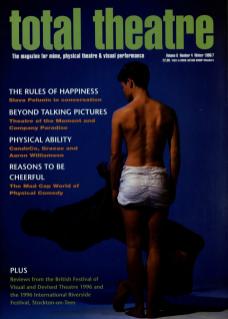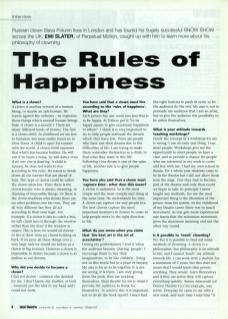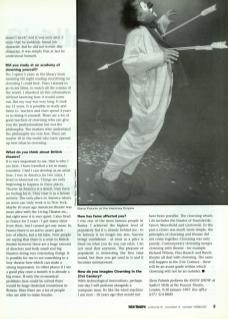What is a clown?
A clown is another version of a human being, or maybe an anti-human. He stands against the ordinary – he expresses those things which normal human beings hide. A clown is a second I. There are many different kinds of clowns. The first is a clown-child. In childhood we are free to fantasize, but soon reality forces us to close doors. A child is open for contact with the world. A clown-child expresses that which has become hidden. He will run if he hears a noise, he will dance even if no one else is dancing. A child is natural, he does not want to live according to the rules. He wants to break down all the barriers that are ahead of him. This type of clown could be called the clown-anarchist. Then there is the clown-lunatic who is always dreaming, or thinking of impossible things. Or there is the clown-madman who thinks there are no other problems but his own. They are all very different but they all act according to their own logic. For example, if a clown is late to catch a bus, he will climb into it through the window rather than the door if the window is nearer. This is how we would all choose to live if there were no chains holding us back. If we pour all these things into a very large sack we would see before us a clown in big trousers. However, a clown is impossible to define because a clown is as endless as our dreams.
Why did you decide to become a clown?
I did not decide – someone else decided for me. I don't know, my mother, or God – someone put the idea in my head and I could not resist.
You have said that a clown must live according to the 'rules of happiness'. What are they?
Each person has one main aim and that is to be happy. As Tolstoy put it to be happy means ‘to give maximum happiness to others’. I think it is very important to try to help people elaborate the dreams which they have lost. There are people who have lost their dreams due to the difficulties of life. I am trying to make them remember themselves as a child, to find what they want in this life. Following your dream is one of the rules of life, another rule is to give people happiness.
You have also said that a clown must 'capture time'. What does this mean?
A clown is unlimited, he is the most simple and the most complicated thing at the same time. He understands his time. A clown can capture the way people live. The best clowns capture the most important moments in history in order to help people move in the right direction in life.
What do you mean when you claim that 'the best art is the art of association'?
During my performances I love it when the audience become 'playing people'. I encourage them to free their imaginations, to be like children – living not in this world but in a place of fantasy. My aim is for us to be together. It is not me acting, it is them. I am only giving them the push, they are working themselves. Ideal theatre for me is when I provoke the audience to think for themselves. To achieve this it is important not to do all the work myself. I must find the right buttons to push in order to let the audience do the rest. My aim is not to persuade my audience that I am an artist, but to give the audience the possibility to be artists themselves.
What is your attitude towards teaching workshops?
Firstly the concept of a workshop for me is wrong. I can do only one thing, I can meet people. Workshops give me the opportunity to meet people, to have a chat, and to provide a chance for people who are interested in my work to come and live with me. I had my own school in Russia. For a whole year students came to be in the theatre but I did not allow them near the stage. First they had to become part of the theatre and only then could we begin to talk. In principle I never taught any methods. For me the most important thing is the liberation of the person from his system. In the childhood of my theatre career there was so much movement. As one gets more experienced one learns that the minimum movement gives the maximum meaning and not the other way round
Is it possible to 'teach' clowning?
No. But it is possible to find out some methods of clowning. A clown is a philosopher, but philosophy is an attitude to life, and I cannot 'teach' my attitude towards life. I can work with a student for a minimum of two years, but this does not mean that I would teach that person anything. They would learn themselves and if they are active they will capture everything quickly. Anton Adassinski (of Derevo Theatre Co.), for example, was active. Everyday he came to me with a new mask, and each time I told him ‘it doesn't work’ and it was only after two years that he suddenly found his character. But he did not invent this character, it was simply that at last he understood himself.
Did you study at an academy of clowning yourself?
No, I spent five years in the library from morning till night reading everything on clowning I could find. Then I started to go to see films, to watch all the comics of the world. I absorbed all this information without knowing how it would come out. But my way was very long. It took me fifteen years. It is possible to study and listen to teachers and then spend four years or so doing it yourself. There are a lot of good teachers of clowning who can give you the professionalism but not the philosophy. The masters who understand the philosophy are very few. There are maybe ten in the world who have opened up new ideas in clowning.
What do you think about British theatre?
It is very important to me, that is why I am here. I have travelled a lot in many countries. I feel I can develop as an artist here. I was in America for two years, lived in Montreal, etc. Things are only beginning to happen in these places. Theatre in America is a desert, they have no feeling for it. They treat it as a leisure activity. The only place in America where an actor can truly work is in New York. Maybe ten years ago American theatre was more alive with the Living Theatre etc, but right now it is very quiet. I also lived in France for two years – I got many ideas from there, but I cannot get any more. In France there is an active avant garde – lots of effects, but a bit false. Now people are saying that there is a crisis in British theatre; however, there are a huge amount of directors and both small and big theatres doing very interesting things. It is possible for me to see something in a tiny theatre here which can make a strong impression. In other places if I see a good play once a month it is already a big event. If only the economical problems here could be solved there would be huge theatrical inventions in Britain. Here there are a lot of people who are able to make theatre.
How has fame affected you?
I was one of the most famous people in Russia. I achieved the highest level of popularity but it is already behind me – to be famous is no longer my aim. Success brings confidence – as soon as a price is fixed on what you do you can relax. I do not need that anymore. The pleasure of popularity is interesting the first time round, but then you get used to it and it becomes unimportant.
How do you imagine Clowning in the 21st Century?
With technological innovations, perhaps one day I will perform alongside a computer man. It’s like the wind machine I use now – ten years ago that would not have been possible. The clowning which I do includes the theatre of Stanislavski, Tairov, Meyerhold and Grotowski. In the past a clown was much more simple, the principles of clowning and theatre did not come together. Clowning was only parody. Contemporary clowning merges clowning with theatre – for example Richard Wilson, Pina Bausch and Butoh theatre all deal with clowning. The same will happen in the 21st Century – there will be an avant garde within which clowning will not be an outsider.
Slava Polunin performs the Snow Show at Sadler's Wells at the Peacock Theatre, London, 9-30 January 1997.


